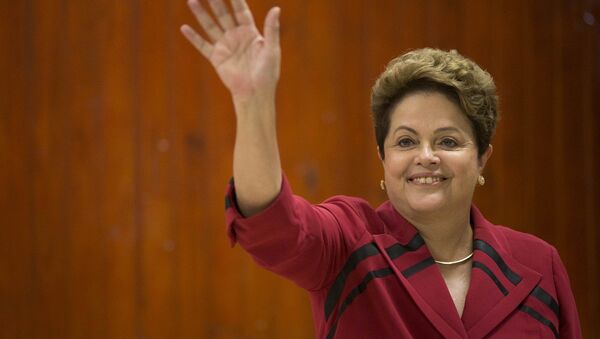MOSCOW, November 15 (Sputnik) — Brazil was proclaimed a federative republic on November 15, 1889.
In 1500, Portuguese navigator Pedro Alvares Cabral landed on the coast of Brazil and called the newly discovered territory the "Island (Land) of the True Cross."
The country owes its modern name to a valuable local timber tree species called the Pau Brazil.
On September 7, 1822, Brazil gained independence from Portugal. The first national constitution was adopted in March 1824. Slavery was abolished in 1888. On November 15, 1889, the Federative Republic of Brazil was proclaimed.
Brazil supported the Entente Cordiale alliance during World War I and the United Nations during World War II. A dictatorship established in 1964 was abolished 21 years later. In 1985, all power was transferred to a civilian government headed by Jose Sarney de Araujo Costa. The transfer from an authoritarian to a democratic regime was not followed by any major social upheavals and bloodshed.
Under the Constitution of 1988, the President, elected by direct universal suffrage for a term of four years, serves as the Head of State, the Head of Government and Commander in Chief.
On Jan. 1, 2011, Dilma Vana Rousseff became the current President of Brazil. On Oct. 26, 2014, she was reelected to this post.
The National Congress of Brazil, composed of the Federal Senate (the upper house with 81 deputies) and the Chamber of Deputies (the lower house with 513 deputies), is the supreme legislative body.
On February 1, 2013, Renan Calheiros became President of the Senate of Brazil, representing the Brazilian Democratic Movement Party. Henrique Eduardo Alves is the President of the Chamber of Deputies.
The largest country in Latin America is located in the eastern and central regions of South America. In the north, it borders on French Guiana, an overseas department and region of France. In the west, it borders Peru. In the southwest, the country borders on Bolivia, Paraguay, Argentina and Uruguay. And, in the east, Brazil is washed by the Atlantic Ocean.
The country measures 4,320 kilometers long from north to south and about 4,330 kilometers long from east to west. The country's area totals 8.5 million square kilometers. Its population is estimated at 200.4 million (2013 census).
The Federative Republic of Brazil includes 26 states and the Federal District containing the capital city of Brasilia. The state language is Portuguese and predominant religion is Roman Catholicism.
Brazil has the largest economy in Latin America.
The modern Brazilian economy boasts well-developed agricultural and industrial production sectors and an up-to-date mining industry, as well as a massive and even advanced (in some respects) service sector.
Brazil primarily operates on industrial goods markets. Automobile, electric appliances, construction materials, cement, communications equipment, metal, transport systems, ready-made clothing and footwear markets are the largest in this category. At the same time, the country traditionally focuses on agricultural markets, with meat and meat products, ethanol, sugar, soy, corn, milk, rice, fertilizer and leather markets being the largest sectors there.
Brazil abounds in mineral resources, including iron ore, manganese, bauxites, zinc, beryllium, niobium, nickel, uranium, gold and others. It also boasts substantial hydropower resources. Hydrocarbon deposits are being developed on its deep-sea continental shelf.
The World Bank estimated Brazil's 2013 GDP at $2,246 trillion.
In 2013, its entire foreign trade turnover reached $482 billion, with exports and imports totaling $242.2 billion and $239.6 billion, respectively.
In January-October 2014, Brazilian export and import volumes totaled $192 billion and $194 billion, respectively.
The main exporters are as follows: China ($36.7 billion), the United States ($22.4 billion), Argentina ($12.2 billion), the Netherlands ($11.5 billion) and Japan ($5.6 billion).
The main importers are as follows: China ($31.5 billion); the United States ($29.8 billion), Germany ($12 billion), Argentina ($11.8 billion) and Nigeria ($7.8 billion).
The tourist industry is a growing, key national economic sector. About 6 million people visit Brazil annually. In June-July 2014, Brazil hosted the FIFA World Cup event and received over 1 million tourists during that period.



